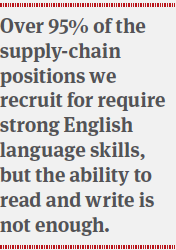Firms are realising the importance of having a solid strategy
The role of procurement has evolved a great deal in Japan over the past 10 years, with global and regional supply administration taking precedence over local sourcing systems.
Most international firms are heavily investing in developing a strong supplier base across Asia, where costs are lower and quality is fast catching up with Japanese manufacturing standards.
Global firms’ procurement teams here benefit from a high purchasing volume and a strong yen to obtain favourable terms and prices in their dealings with overseas suppliers. At the same time, the firms invest in manufacturing facilities and labour training for overseas suppliers, receiving in exchange preferred buyer status and price advantage.
However, multiple challenges remain. Among these is the traditional method of placing orders over the telephone with local suppliers, which is still prevalent in Japan. Then there is the fact that many purchasing teams remain in the back office, where they do not perform the forward-looking strategic role that might be expected of them.
“Procurement divisions in Japan continue to be reactive and not proactive, regularly ignoring global procurement guidelines and not developing long-term supplier relationships”, a senior procurement manager commented.
“While procurement has definitely evolved over the past few years, top management in Japan needs to place direct and indirect cost management at the centre of their growth strategy for the country”, he added.
The traditional practice of placing procurement requests when required by internal stakeholders, instead of earlier in the procurement cycle, exerts significant pressure on the procurement division to deliver short-term results. Long-term supplier relationships and vendor performance management are ignored.
In addition, while efforts are made to balance a firm’s legal, compliance and financing requirements, there is a constant struggle to ensure that procurement-related decisions enhance the firm’s bottom line over the long term.
Procurement is changing rapidly in Japan, as businesses realise the strategic importance of having a solid procurement strategy, and given that the costs of doing business here are among the highest worldwide.
From a recruitment perspective, there has been a significant increase in demand for procurement professionals at management and director levels. For example, there are many job opportunities for individuals with indirect purchasing skills and the ability to manage internal stakeholders as well as external suppliers.
Traditionally the domain of corporate or administrative support functions, indirect procurement functions that manage all non-product related spending, are increasingly being established at gaishikei (foreign-capitalised firms doing business in Japan) of all sizes.
Furthermore, large, traditional consulting firms in Japan have seen strong growth in the area of procurement-related consulting, as have the increasingly more numerous independent procurement-focused consultancies.
By applying procurement best practices and leveraging their global networks, these consulting firms can quite quickly deliver higher cost savings than do internal procurement teams.
More recently, many firms have come to expect two further trends from their procurement function, namely, engagement with internal clients and the ability to move from transaction processing to supply-risk management.
This is important for two reasons:
- Internal clients are often ignorant of procurement policies. They want their requirements fulfilled quickly and often without confirming the lowest rates available or the commercial terms agreed with suppliers. Thus, it is important for procurement leaders to educate and collaborate with internal clients, to ensure they buy into the procurement processes and influence their own teams.
- As the procurement function becomes global, the risks associated with suppliers’ solvency and their ability to deliver products increase.
Thus the procurement function not only must agree to favourable terms, but also must audit suppliers and confirm their ability to meet increased requirements in the future.
As it becomes increasingly global, procurement continues to evolve as a strategic function in Japan, and the demand for professionals in the field is expected to increase.
Thus, professionals with strong procurement backgrounds and the ability to establish a purchasing division—or optimise the existing procurement function—will remain at a premium in the market.


